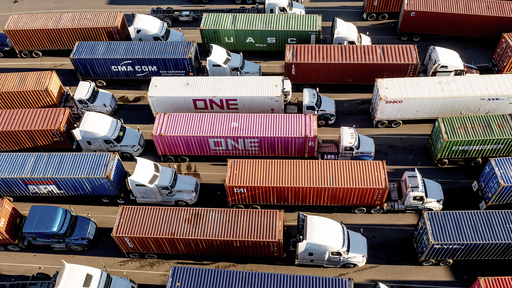
A new U.S. tariff on Chinese-made goods is anticipated to push up consumer prices across a wide range of products, affecting everything from low-cost clothing found on online marketplaces to toys and electronic devices like computers and smartphones.
On Tuesday, a 10% tariff on all imports from China was activated, just one day after President Trump decided to delay suggested tariffs on goods from Mexico and Canada for a period of 30 days. This pause followed discussions about Trump’s demands for these nations to act on curbing illegal immigration and the influx of drugs such as fentanyl into the United States.
In response to the absence of a similar exemption from the White House, China announced it would implement retaliatory tariffs on some American goods starting the following week.
The extensive range and quantity of products imported from China mean that American residents can expect to see costs rise for many items that are typically affordable, provided these reciprocal tariffs continue.
Notably impacted will be categories like electronics, home supplies, and automotive parts. The U.S. imported approximately $427 billion in goods from China in 2023, according to the U.S. Census Bureau. This figure includes significant categories such as consumer electronics, which encompass smartphones, laptops, and various tech accessories.
China plays a key role in producing technology products, including for major American companies like Apple, who have their assembly lines located there. According to the Consumer Technology Association, in 2023, China supplied 78% of U.S. smartphone imports and 79% of laptop and tablet imports.
In addition to electronics, the tariffs are also likely to influence prices for inexpensive apparel, footwear, kitchen items like pots and pans, as well as more significant purchases such as appliances and automotive components. Jay Salaytah, who owns an auto repair shop in Detroit, shared that he expedited the purchase of some tools, foreseeing higher costs if import tariffs were enacted.
Alongside the new tariff, Trump’s executive order suspended a lesser-known trade exception that had allowed goods valued under $800 to enter the U.S. free of duty. This change raises the possibility of still using this exemption for imports from other nations.
The “de minimis” rule has been in place for nearly a century but has faced increased scrutiny due to the rising quantity of low-cost products entering the U.S. from China, largely through popular online retailers such as Shein, Temu, and Alibaba’s AliExpress.
During the previous administration, plans to close this loophole were initiated, but the rules were not enacted before leaving office.
Shein and Temu burst onto the global scene by offering a constantly refreshed selection of extremely affordable clothing, gadgets, and accessories shipped primarily from China. In response, American giant Amazon is developing a competing online store that mimics their business approach by offering low-cost products sent directly from Chinese suppliers.
Chinese exports of low-cost packages surged to $66 billion in 2023, a substantial increase from $5.3 billion in 2018, according to a report by the Congressional Research Service. Combined, Temu and Shein hold approximately 17% of the discount market in fast fashion, toys, and other consumer goods in the U.S.
The degree to which prices will rise remains uncertain. Previously, under the de minimis provision, retailers like Shein, Temu, and AliExpress could avoid customs taxes. However, with the new regulations taking effect, these shipments will now incur both existing duties and the new 10% tariff.
Analyst Youssef Squali indicated that since most of these orders are typically valued at less than $800, a majority will likely be affected by the new tax.
Juozas Kaziukenas, the founder of the e-commerce intelligence company Marketplace Pulse, believes that price increases on platforms such as Shein and Temu will be minimal, and their goods will remain affordable. However, the new regulations could cause delivery delays due to the packages now needing to undergo customs processes.
Third-party sellers on platforms like Amazon that import from China will also feel the impact of the tariffs, according to Squali. He predicts a mixed outcome of some costs being absorbed by sellers, with the remainder passed along to consumers, potentially leading to mid-single digit percentage increases. Other e-commerce sectors like Etsy will similarly be affected.
Temu, owned by China’s PDD Holdings, has previously stated that its growth isn’t solely reliant on the de minimis policy. Although its products chiefly ship from China, the company is actively encouraging Chinese merchants to maintain inventory within the U.S. This strategy could lessen the impact of the changing regulations on their business.
In January, China also introduced initiatives to bolster cross-border e-commerce by facilitating overseas warehousing through tax rebates or exemptions.
U.S. retailers are responding to new tariff implications. Brieane Olson, CEO of the teen fashion chain PacSun, traveled to Hong Kong after the presidential election to negotiate with factory leaders regarding strategies to adapt to Trump’s tariff approach. Approximately 35% to 40% of PacSun’s clothing originates from China, although the company is also diversifying its supplier base to include countries such as Cambodia and Vietnam.
Despite the situation, Olson mentioned that the anticipated 10% tariff was less severe than expected, so PacSun currently plans to avoid raising prices or relocating manufacturing for its knitwear and denim products.
Toys, heavily reliant on Chinese imports, may also experience the effects of the tariffs. According to Greg Ahearn, president and CEO of The Toy Association, toy companies sourcing products from China are likely to initially absorb costs associated with the new tariff, but these expenses will eventually be transferred to consumers.

